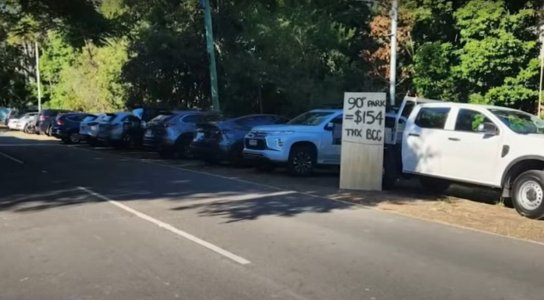Outrageous $154 Fines for Street Parking! How Residents are Fighting Back Against Unfair Council Rules
- Replies 7
In the quiet streets of Graceville, Brisbane, a storm is brewing, and it's not just the typical Queensland weather. Residents are up in arms over a contentious council rule that has seen nearly 90 motorists slapped with hefty $154 fines for parking their cars perpendicular to the kerb. This practice, which locals argue allows for more cars to fit into the bustling area, has been strictly prohibited by authorities, sparking a community-wide call for common sense and change.
The issue came to a head during the state seniors netball carnival in April, which brought 2000 players, their families, and officials to the small club for four days of matches. With the influx of visitors, parking became a premium, and many were stung with fines for angled parking—a method residents say they've safely and practically used 'for decades.'
One local, Caio Fernandes Nicacio, expressed his frustration to 9News, revealing he received three fines himself. 'We get parents parking about six blocks away to be able to get to the netball games,' he said. The sentiment is echoed by Lee Gunn, another resident who alleges the council is simply 'revenue collecting' by enforcing parallel parking, which significantly reduces the number of cars the street can accommodate.

In a bid to protect their community and visitors alike, neighbours have taken matters into their own hands, creating makeshift signage to warn drivers of the costly consequences of angular parking. Gunn shared his own experience of adhering to the rules, only to be met with disapproving glances from passersby who see him as hogging space by parking parallel.
The Brisbane City Council, in response to the outcry, told 9News that it aims to balance the needs of residents and attendees and is investigating ways to allow angled parking in the area. Independent councillor for Tennyson Ward, Nicole Johnston, has voiced her support for the residents, stating that 'the simple fix for this is to put angled parking signage in and let residents park the way they have parked for decades.'
This parking predicament highlights a broader issue faced by many communities across Australia, where outdated or inflexible regulations fail to keep pace with the evolving needs of growing suburbs. It's a reminder that local governance should be adaptable and responsive to the people it serves.
As the residents of Graceville continue their fight against what they see as an unfair rule, their story serves as an inspiration for others to stand up for common sense in their own neighbourhoods. It's a call to action for councils everywhere to listen to their constituents and work collaboratively towards solutions that benefit all parties involved.
 We at the Seniors Discount Club understand the importance of community and the need for rules that reflect the realities of everyday life. We encourage our readers to share their own experiences with local council regulations and how they've navigated these challenges. Have you faced similar issues in your area? What steps did you take to address them? Join the conversation and let us know in the comments below.
We at the Seniors Discount Club understand the importance of community and the need for rules that reflect the realities of everyday life. We encourage our readers to share their own experiences with local council regulations and how they've navigated these challenges. Have you faced similar issues in your area? What steps did you take to address them? Join the conversation and let us know in the comments below.
The issue came to a head during the state seniors netball carnival in April, which brought 2000 players, their families, and officials to the small club for four days of matches. With the influx of visitors, parking became a premium, and many were stung with fines for angled parking—a method residents say they've safely and practically used 'for decades.'
One local, Caio Fernandes Nicacio, expressed his frustration to 9News, revealing he received three fines himself. 'We get parents parking about six blocks away to be able to get to the netball games,' he said. The sentiment is echoed by Lee Gunn, another resident who alleges the council is simply 'revenue collecting' by enforcing parallel parking, which significantly reduces the number of cars the street can accommodate.

Nearly 90 motorists in Graceville, Brisbane, received $154 fines each for parking perpendicular to the kerb in violation of council regulations. Credit: YouTube / 9 News Australia
In a bid to protect their community and visitors alike, neighbours have taken matters into their own hands, creating makeshift signage to warn drivers of the costly consequences of angular parking. Gunn shared his own experience of adhering to the rules, only to be met with disapproving glances from passersby who see him as hogging space by parking parallel.
The Brisbane City Council, in response to the outcry, told 9News that it aims to balance the needs of residents and attendees and is investigating ways to allow angled parking in the area. Independent councillor for Tennyson Ward, Nicole Johnston, has voiced her support for the residents, stating that 'the simple fix for this is to put angled parking signage in and let residents park the way they have parked for decades.'
This parking predicament highlights a broader issue faced by many communities across Australia, where outdated or inflexible regulations fail to keep pace with the evolving needs of growing suburbs. It's a reminder that local governance should be adaptable and responsive to the people it serves.
As the residents of Graceville continue their fight against what they see as an unfair rule, their story serves as an inspiration for others to stand up for common sense in their own neighbourhoods. It's a call to action for councils everywhere to listen to their constituents and work collaboratively towards solutions that benefit all parties involved.
Key Takeaways
- Nearly 90 motorists in Graceville, Brisbane, were fined $154 each for parking perpendicular to the kerb, against council rules.
- The local community argues that angled parking allows for more cars in the busy area and has been safely practiced for decades.
- Brisbane City Council is looking into permitting angled parking, following backlash from the residents and a significant number of fines issued.
- An independent councillor supports the residents' call for commonsense regarding the parking situation, suggesting the installation of angled parking signs.







